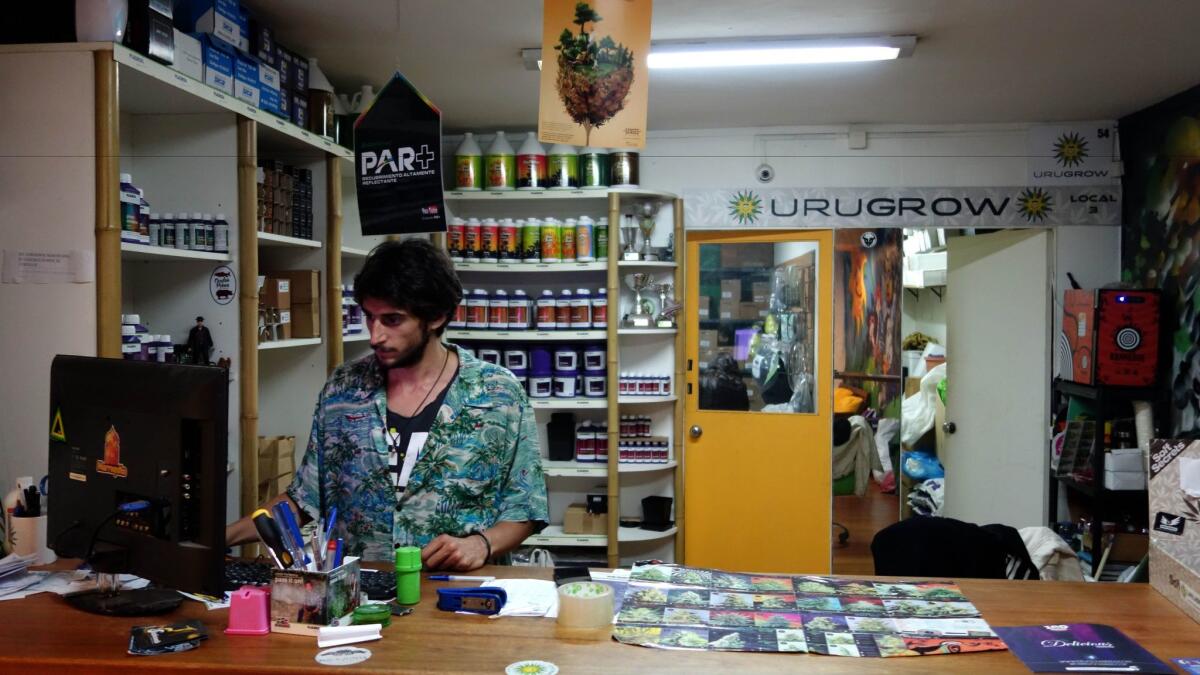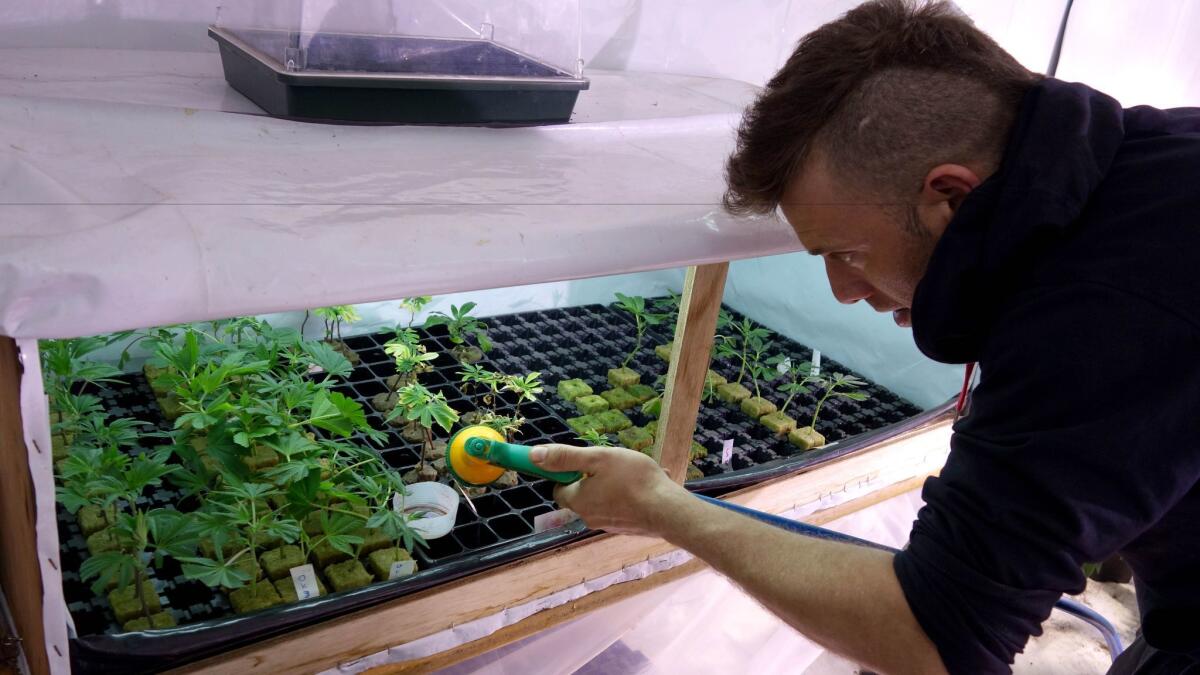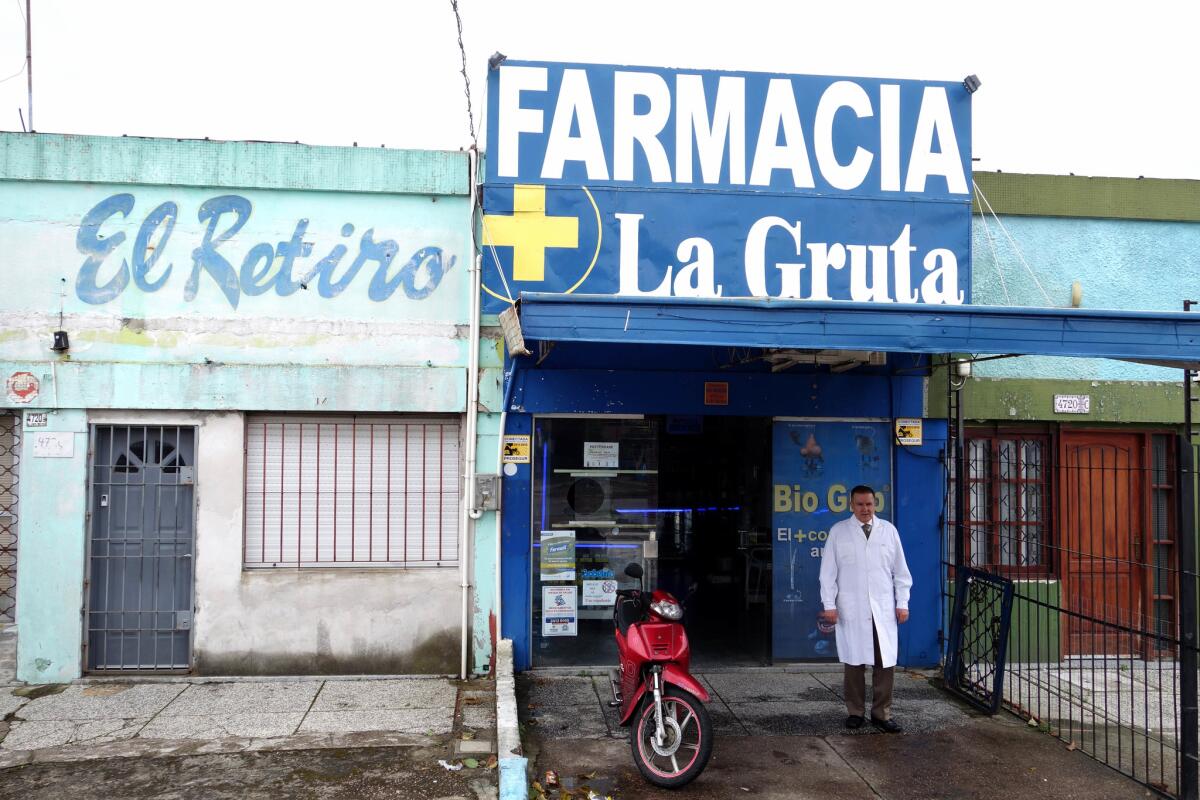In a first for Latin America, Uruguay rolls out program legalizing marijuana

Reporting from Montevideo, Uruguay — Diego Prandini is bent over in a small, brightly lit room, watering marijuana plants of all shapes and sizes. He crawls into a corner to reach some smaller specimens, labeled with names like “Ushua” and “RGB1,” all of which will be part of the next two-kilogram harvest.
“I’ve been at this for seven hours today,” he says, standing and smiling. “So my back is starting to get a little tired.”
Until recently, this job would have been illegal, and he might have worked for dangerous narcotraficantes, perhaps in hidden in nearby Paraguay. But Prandini, 37 and sporting a T-shirt and mohawk, tends his plants in a pleasant middle-class neighborhood of Uruguay’s capital, and as a break, he heads downstairs to enjoy a joint with his co-workers and watch YouTube videos.

The copious smoke they blow out is visible from the street, and next door, their shop sells pipes, marijuana seeds and smoking paraphernalia. Some Brazilian tourists wander in, asking if they can buy some finished marijuana. They can’t.
It’s not legal to buy weed on the street in Uruguay — yet — but Prandini and his colleagues are taking advantage of Latin America’s first full pot legalization project, which has been carefully and gradually rolled out as Uruguay hopes to serve as a model for its neighbors and minimize unintended consequences of the effort.
The country now has many legal cannabis clubs, which pool resources to grow copious amounts of marijuana and distribute it to registered, paying members — no doctor’s note required — who can then smoke where they please. Legislation passed in 2013 also allows Uruguayan residents to sign up to grow plants at home for personal use; soon, pharmacies will begin selling small amounts of cannabis to enlisted users across the country.
Some here have criticized the slow, uneven pace of the program, but legislator Sebastian Sabini, one of the main proponents of the law, said that it is far more important to do the program right so that it serves as a model for legalizing other substances and ending the deadly and unproductive war on drugs.
“Latin America is one of the regions which has suffered the most from the politics of prohibition,” said Sabini, sitting in his congressional office in Montevideo decorated with a Che Guevara poster and a flier he picked up while visiting a marijuana shop in Colorado. “We have a low-intensity undeclared war in Mexico, with 25,000 disappeared and 60,000 killed in recent years; we have wide-scale impunity and areas where narco traffickers control daily life. We see drug groups donating to political campaigns, forming alliances with the state and infiltrating our institutions, all of which generates more violence than we already would have as a poor and unequal part of the world.”
The Uruguay program comes as states in the U.S. consider legalizing marijuana. On Tuesday, California, Nevada and Massachusetts voted to legalize pot for recreational use and a similar vote in Maine was too close to call.
In contrast with the United States, Uruguay aims to avoid the creation of lucrative marijuana businesses. Profits are tightly controlled, there are no brands and advertising is banned. It’s an approach Sabini would like to see extended to other intoxicating substances. He hopes that by proving careful regulation can prevent increased usage, decriminalization can be extended to cocaine. He also would like to ban all advertising on alcohol.
Uruguay, a quiet nation of just 3.5 million residents, is considered one of the most safe and stable countries in Latin America, and its residents enjoy a quality of life often approaching parts of Europe. It’s also often led other countries in the region in adopting liberal causes. The country legalized divorce and votes for women early in the 20th century, and more recently, popular former president José “Pepe” Mujica — a former left-wing guerrilla who ruled the country while driving around in an old Volkswagen Bug — oversaw the legalization of abortion and same-sex marriage, as well as the cannabis law.
Neighboring Brazil and Argentina have no plans to legalize marijuana, so Uruguay took steps to avoid becoming a marijuana tourist destination.
The cannabis registration program is only open to Uruguayans and long-term residents, which doesn’t stop Brazilians and Argentines from often stumbling into grow shops trying — and failing — to buy a gram of weed. Club members and home growers are technically prohibited from selling their finished product, but authorities admit many probably do so.
Since Uruguay passed its 2013 law, both Colombia and Chile have taken steps to legalize medical marijuana — allowing clubs to grow for personal use — but stopped far short of allowing cultivation and sale for recreational use.

Jorge Suarez, president of Uruguay’s Pharmacy Assn., says he sees no problem with eventually selling the product directly to tourists. “If Uruguayans can buy a little bit of the drug, why can’t they?”
Suarez has agreed to sell the drug when it becomes available, but he admits many of his colleagues have balked at being asked to sell a narcotic at low prices and have yet to sign up for the program.
“Many simple pharmacies say they don’t have much in the terms of security to protect a valuable product like that. But if we are selling it so cheap, and it’s everywhere, why would people rob us for that? I think they’d be more likely to ask for money or take our hair-care products, like they usually do,” he said.
The marijuana supplied to the shops is being mass produced by two companies licensed by the government, and the final launch of the pharmacy program is being held up by a postal service labor dispute.
Even as members of Uruguay’s smoking clubs say they strongly support the broad spirit of the law, some mumble about its specifics, saying they’re worried the pharmacy weed will be low-quality, or complaining that they should be able to use their growing experience to expand their small businesses and sell.
Laura Blanco, president of Uruguay’s Cannabis Studies Assn., admits she has her own small quibbles with the law. But she says it would be an error to go the more North American route and treat marijuana just like any other consumer good.
“We strongly defend a collective system not motivated by profit. Basically, because we believe that this needed to be separated from the market,” says Blanco, surrounded by American books from back to the ’60s and ’70s on marijuana and other drugs. “It’s a substance that changes your mind.”
Bevins is a special correspondent.
ALSO
California scrambles to implement new recreational pot law
‘Calexit’ movement says Trump win helps their calls for California to secede
Can Trump fulfill his campaign promises on immigration and trade? Mexico hopes not
More to Read
Sign up for Essential California
The most important California stories and recommendations in your inbox every morning.
You may occasionally receive promotional content from the Los Angeles Times.









